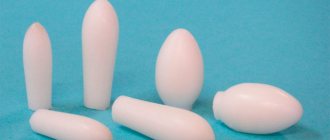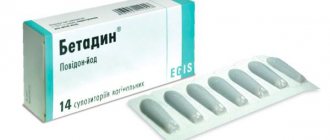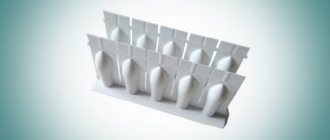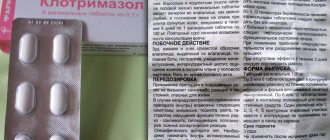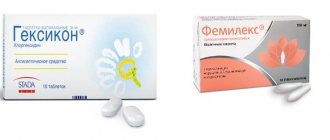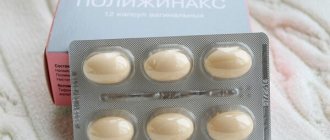10/28/2020 Alena Masheva Health
Bacterial vaginosis is a disorder of the vaginal microflora, which manifests itself in a decrease in the level of beneficial lactobacilli and an increase in the number of pathogens on its mucous membrane. The disease is accompanied by unpleasant discharge with a rotten odor, pain in the lower abdomen, as well as itching and burning in the genital area.
The main advantages of vaginal products
Why are suppositories prescribed for vaginosis more often than oral medications? The fact is that vaginal medications have a number of advantages:
- Medicines work at the site of the lesion.
- The rapid effect is explained by the direct effect on the pathogen.
- The active substance is not distributed throughout the body.
- There is no negative effect of the drugs on the digestive tract.
- Minimum side effects and contraindications.
Despite their positive qualities, women with suspected vaginosis should not use suppositories on their own. If you experience a burning sensation, unpleasant discharge or abdominal pain, you should consult a doctor.
What diseases can it be associated with?
Bacterial vaginosis itself is a completely harmless condition, but its danger lies in the fact that it serves as the basis for the development of a wide variety of very dangerous conditions - inflammatory and infectious. Bacterial vaginosis can precede or be a consequence of any sexually transmitted disease, in particular:
- HIV;
- gonorrhea;
- syphilis;
- trichomoniasis;
- chlamydia and others;
If it is possible to establish which microorganism predominates in the disturbed microflora, the following diagnoses are established:
- vaginal candidiasis - due to the predominance of Candida fungi in the microflora;
- gardnerellosis - due to the predominance of facultative anaerobes of the genus Gardnerella in the microflora;
- mycoplasmosis - due to the predominance of Mycoplasma hominis and Mycoplasma genitalium bacteria in the microflora;
- ureaplasmosis - due to the predominance of Ureaplasma urealyticum bacteria in the microflora.
Often bacterial vaginosis develops into an inflammatory lesion of the female external and internal genital organs:
- adnexitis - inflammation of the uterine appendages;
- vulvitis - inflammation of the female external genitalia, vulva;
- colpitis - inflammation of the vaginal mucosa;
- cervicitis - inflammation of the cervix;
- endometritis - inflammation of the uterine mucosa.
Using drugs for vaginosis: suppositories
Vaginal medications have their own characteristics.
- Most often, such drugs require compliance with storage conditions. If the manufacturer recommends keeping the medicine cold, then this must be done.
- Most medications are taken once a day. In this case, suppositories should be administered before bedtime. After use, you must remain in a horizontal position for 15 minutes to an hour.
- Some medications should not be used during menstruation. It is necessary to take this information into account and choose the right time for treatment. There are drugs that prohibit sexual activity during treatment.
- Vaginal suppositories should only be inserted with clean hands.
Modern medicine allows the use of various medications for vaginosis. Suppositories with a certain active ingredient are prescribed to the patient after the examination. Diagnostics includes an analysis to identify the causative agents of the pathology, of which there are usually several.
Combined "Terzhinan"
Terzhinan suppositories are a kind of tablets that dissolve perfectly in water. They are available in packs of 6 and 10 pieces. Small packs are suitable for prevention, and large packs are needed for therapeutic purposes. If necessary, the doctor can extend therapy up to 20 days.
The drug "Terzhinan" contains three components:
- ternidazole – against fungal pathogens;
- neomycin – antibacterial substance;
- nystatin is an antibiotic with an antifungal effect.
The medication also includes prednisolone, which eliminates the inflammatory process. Terzhinan suppositories help cope with mixed vaginosis. The medicine can be used during pregnancy and after childbirth. The active ingredients are not absorbed into the bloodstream and almost never cause adverse reactions. Before administering the tablet, you need to moisten it under running water, which will help the drug dissolve faster. The cost of 10 tablets does not exceed 500 rubles.
Complex "Neo-Penotran"
Suppositories for the treatment of bacterial vaginosis often contain not one, but several active ingredients. Suppositories “Neo-Penotran” have a similar effect to “Terzhinan”. They contain the antifungal component miconazole and the antibiotic metronidazole. This drug will be effective if vaginosis is caused by the proliferation of anaerobic bacteria.
The peculiarity of this medicine is that it must be used 2 times: morning and evening. The therapeutic course lasts 7 days, but can be doubled if necessary. The use of Neo-Penotran suppositories is contraindicated in the first trimester of pregnancy (due to the risk of affecting the developing fetus) and during lactation. The price of 10 suppositories is 800 rubles.
Application of "Terzhinan"
The instructions for the drug contain recommendations for the use of one suppository at night, before bed. The duration of treatment with suppositories for thrush and bacterial vaginosis is about 12 days. Only a doctor can, if necessary, continue it or reduce it altogether, based on test results. Practice proves that the use of Terzhinan should be continued until the last day of the course of treatment. Even if all the symptoms have passed, the result must be consolidated, and a sudden break can trigger the resumption of growth of pathogenic bacteria.
The advantage of these suppositories for the treatment of bacterial vaginosis is the possibility of use in the second and third trimesters of pregnancy. Also, these suppositories have no contraindications. The only nuance of using the drug is the impossibility of treating girls who are not sexually active, since the suppositories must be inserted as deep as possible into the vagina, otherwise they will not have such an effective effect in the fight against bacterial infections.
Inexpensive "Flagyl"
As you can see, drugs for treating bacterial infections of the vagina are quite expensive. Many patients wonder: are there cheap suppositories for vaginosis? It turns out that it is quite possible to find an inexpensive medicine. But will it be as effective as expensive substitutes?
Flagyl vaginal suppositories contain the active ingredient metronidazole. The cost of 20 tablets with a dosage of 250 mg does not exceed 150 rubles. The 500 mg volume of the active substance is more expensive. 10 such suppositories cost 750-800 rubles.
Suppositories are used once a day for a week. Therapy cannot be continued for more than 10 days. Practice shows that the use of inexpensive suppositories with a low dosage does not give the desired effect, therefore, for the treatment of vaginosis, doctors prefer to prescribe vaginal capsules containing 500 mg of metronidazole.
You can replace Flagyl with Metronidazole suppositories.
Patients who are unable to purchase expensive medications do not need to despair and believe that vaginosis cannot be cured. The candles with the lowest price today are Metronidazole. A package with a capacity of 10 tablets of 500 mg costs 170-200 rubles. If you are prescribed the drug "Flagyl", then be sure to find out whether it can be replaced with the Russian "Metronidazole".
Suppositories are used once a day before bedtime for a week. If necessary, the course of treatment is extended to 10 days. You cannot use vaginal Metronidazole in the first trimester of pregnancy and during lactation. Some blood diseases are also a reason to choose alternative therapy. During treatment with this drug, alcohol consumption is prohibited.
"Dalacin" for bacterial vaginosis
After the examination, the gynecologist may prescribe you the drug “Dalacin” (suppositories). The treatment regimen for vaginosis is established taking into account all the characteristics of the female body. The average duration of therapy is 3 days. However, in some cases it may be necessary to extend the course to a week, then the suppositories are replaced with cream.
For the drug "Dalacin" (suppositories), the treatment regimen for vaginosis involves the daily administration of suppositories before going to bed. Use an applicator to position the capsule correctly in the vagina. This drug should not be used if you are hypersensitive to clindamycin (the active substance) or lincomycin. Please note that it is not recommended to use any other vaginal medications during the Dalatsin course. The cost of three vaginal capsules is about 800 rubles.
"Clindacin" - a substitute for "Dalacin"
Effective suppositories for vaginosis, which are cheaper than the previous drug, are Clindacin. Three suppositories cost an average of 550 rubles. You can replace these products with a cheaper cream “Clindamycin” (450 rubles). The active ingredient in all these pharmaceutical products is the antibiotic clindamycin.
The use of Clindacin suppositories is indicated for bacterial vaginosis caused by various pathogenic microorganisms. The drug is prohibited in the first trimester of pregnancy. In later stages and during lactation it can be used exclusively as prescribed by a doctor. The course of treatment varies from 3 to 7 days. It has been established that the active substance clindamycin can pass into breast milk. During lactation, the medicine can be used, but only under the supervision of a doctor.
"Makmiror" in the treatment of vaginosis
This drug is unique in that it belongs to the group of nitrofurans. The active ingredients of vaginal suppositories are nifuratel and nystatin. The medicine is effective against gram-negative and gram-positive microorganisms. It copes with enterobacteria and protozoa, treats vaginal candidiasis.
"Makmiror" is used for vaginal infections caused by microorganisms sensitive to it: trichomonas, chlamydia, candida and others. The course of treatment lasts 8 days, unless the doctor gives other recommendations. The daily dose is equal to one candle. Macmiror suppositories can be prescribed to women during pregnancy and after childbirth. It is permissible to combine the medication with other vaginal products. The average cost of 8 suppositories is 800 rubles.
Severity
According to the severity of vaginal dysbiosis, there are:
| Compensated or 1st degree | there is no microflora in the smear, epithelial cells are present without changes and the possibility of infection with other pathogenic microorganisms remains. |
| Subcompensated or 2nd degree | the content of Doderlein bacilli decreases, gram-negative and gram-positive flora increases, there are from 1 to 5 “key” cells, a slight increase in leukocytes - up to 15 - 25. |
| Decompensated or 3rd degree | there are no lactic acid bacteria, there is a clinical picture of the disease, “key” cells entirely, various pathogenic and facultative or conditionally pathogenic microorganisms. |
According to the flow, acute, torpid or erased and asymptomatic vaginal dysbiosis is distinguished.
After the therapeutic course: reviews
Many suppositories for vaginosis receive good reviews. The effectiveness of the drugs is explained by the fact that the doctor studies the patient’s tests before prescribing. Based on what pathogens cause the disease, suitable medications are recommended. Often, topical preparations (suppositories) are supplemented with oral antibiotics.
After treatment, the patient must be examined again. The interval between using the last vaginal tablet and taking tests should be at least 14 days. The results obtained will show how effective the chosen therapy was. If the number of colonies of pathogenic microorganisms has been reduced to a minimum, then the woman is prescribed restorative medications. Preparations based on lactobacilli, probiotics and prebiotics are used to normalize the vaginal microflora. Immunomodulators and vitamin complexes are recommended to maintain the body's defenses.
Let's summarize
Vaginosis is an imbalance of the vaginal microflora. A seemingly harmless disease can lead to unpleasant consequences in the future. If you are suffering from unusual white, yellowish or gray discharge, itching, burning of the genitals, you should consult a gynecologist as soon as possible. Knowledge of the drugs used to treat pathology should not encourage you to self-medicate. The type of pathogenic microorganisms that cause vaginosis can only be determined through laboratory tests.
Bacterial vaginosis is an abnormal gynecological condition characterized by vaginal discharge caused by an overgrowth of abnormal bacteria.
Vaginosis is not a true bacterial infection, but rather a dysbiosis (an imbalance of bacteria that are normally present in small numbers in the vagina).
Until recently, the disease was called gardnerellosis, because it was believed that the only causative agents were the bacteria Gardnerella vaginitis (Gardnerella). The new name (bacterial vaginosis) reflects the fact that there are many more microorganisms that live in the vagina and can begin to multiply uncontrollably.
Symptoms
Often the only symptom of bacterial vaginosis is the presence of copious vaginal discharge with an unpleasant smell of stale fish, which can bother you for a long time. At the beginning of the disease, the discharge is thin, white or grayish.
The general symptoms of bacterial vaginosis are as follows:
- discharge with an unpleasant odor (fishy), which occurs as a result of the breakdown of amines produced by anaerobic bacteria.
- copious, homogeneous, creamy vaginal discharge of a grayish-white color, adhering to the walls of the vagina.
- sometimes vulvovaginal irritation appears in the form of itching and burning, discomfort during sexual intercourse.
- signs of vaginal inflammation (addition of vaginitis) are observed in half of the patients.
- rarely - urination disorders and pain in the perineum.
Advantages and disadvantages of using drugs in the form of suppositories for the treatment of vaginosis
To treat bacterial vaginosis, medications can be used in the form of tablets, injection suspensions, and IV solutions. But gynecologists usually prescribe vaginal creams, gels and suppositories for vaginosis as first-choice drugs.
The most important advantage of topical medications is that side effects are less likely than when taking pills or administering antibiotics systemically. It has also been scientifically proven that complete cure is observed in 8 out of 10 cases .
The disadvantages of using suppositories for bacterial vaginosis include:
- Prohibited use by pregnant women;
- Exacerbation of thrush due to non-compliance with hygiene rules during the administration of suppositories;
- Weakening the protective properties of latex condoms, intrauterine devices, and contraceptive foams.
It is also worth noting that with constantly recurrent vaginosis, it is not advisable to use suppositories. In addition to the development of resistance, there is a risk of dysbacteriosis and thrush.
Causes
To date, science does not fully have information about what actually provokes the development of non-inflammatory syndrome. However, the relevance of this problem is increasing every year.
Factors that provoke the development of the disease include:
- weakening of local and general immunity;
- poor nutrition;
- long-term antibacterial and hormonal therapy;
- frequent douching;
- the use of local contraceptives (condoms, creams and suppositories) that contain 9-nonoxynol;
- frequent change of sexual partners;
- wearing synthetic underwear;
- endocrine and gynecological pathologies;
- failure to comply with basic rules of personal hygiene;
- intestinal diseases.
Currently, bacterial vaginosis is one of the most common diseases among women of active reproductive age (from 23 to 33 years). According to statistics, about 30-35% of women suffer from vaginosis, but only half of the total number of patients know about their problem due to the presence of a characteristic odor. The rest, as a rule, don’t even know about it. [adsense1]
Clindamycin: the most proven drug
Despite the fact that the list of medications in the form of suppositories is quite extensive, Clindamycin remains the most effective and prescribed. An antibiotic stops the growth of bacteria.
To avoid the development of resistance, it is important to use the medicine as directed by your doctor. In most cases, it is enough to administer the suppository once a day before bed for 4-6 days (depending on the intensity of the symptoms).
Before administration, wash your hands thoroughly with warm water and soap. If there is any residual discharge on the labia, wash it. But you shouldn’t douche or insert a suppository immediately after removing the sanitary tampon. A topical antibiotic will work best if it is in a hostile environment rather than a perfectly clean environment.
The instructions recommend injecting Clindamycin into the upper third of the vagina. To prevent the suppository from falling out, you need to go to bed immediately after the procedure.
Medicines in the form of suppositories work best when the amount of the active component in the body does not decrease during the entire treatment period. Therefore, it is important to administer the drug at approximately the same period of time, and also to avoid sexual intercourse and the use of tampons.
General recommendations for the treatment of vaginal dysbiosis
In order for bacterial vaginosis to be successfully eliminated, you must adhere to the following recommendations:
- If you suspect a disease, visit a doctor.
- Do not prescribe medications such as Metronidazole, Terzhinan, Hexicon on your own.
- Metronidazole is better used in tablet form than in gel form.
- Terzhinan should be used only after conducting a special study on the sensitivity of bacteria to it.
- During pregnancy, use Hexicon suppositories.
- Use folk remedies (douching, tampons, baths) at home only after consulting a doctor.
- Douching should not be done too often, as this helps to “wash out” beneficial bacteria and can provoke vaginosis.
Macmiror Complex: suppositories for vaginosis, dysbacteriosis
The combined drug Makmiror is available in the form of tablets and in the form of suppositories for topical use (Makmiror complex). Vaginal suppositories consist of nifuratel and nystatin and have a weak antibacterial effect. Macmiror is active against Trichomonas vaginalis and Candida, and can be used for vaginal dysbiosis.
The mechanism of action of the drug is quite simple. Nystatin fights fungi and protozoan microorganisms. Nifuratel acts as an antibiotic. When it binds to sterol, the permeability of the bacterial cell membrane is disrupted, which leads to their death.
The combination of nystatin and nifuratel allows one to achieve more pronounced antifungal activity and expand the spectrum of antimicrobial action of oral drugs.
The high efficiency and low toxicity of the drug components determine a wide range of its clinical use. For example, Macmiror Complex is used not only in the treatment of vaginosis of mixed or unknown etiology, but is also used for the prevention of fungal infections and the treatment of trichomoniasis. Suppositories are also prescribed for vaginal dysbiosis.
The instructions suggest administering one suppository once a day before bed for a week. During menstruation, treatment is interrupted. To achieve maximum therapeutic effect, it is necessary to place the suppository in the upper part of the vagina.
Treatment regimen with "Makmiror"
The combination of two active substances of the drug makes it possible to achieve a pronounced antifungal effect, as well as expand the scope of the antimicrobial action of other oral drugs. The instructions for the suppositories state that for effective treatment of bacterial vaginosis, one suppository must be inserted into the vagina every evening. Duration of use – 7 days. If menstruation occurs, treatment should be stopped and then continued as prescribed by the gynecologist.
Polygynax: a drug that is also used in pediatric gynecology
The main active ingredient of Polygynax suppositories is neomycin, which is an aminoglycoside antibiotic. Additional components include nystatin and polymyxin sulfate.
It should be taken into account that in fact Polygynax is not a suppository for bacterial vaginosis, but rather tablets. Therefore, the active components are poorly absorbed into the bloodstream. This property of the drug will suit those who are afraid of the development of resistance.
Moreover, on the shelves of pharmacies you can find Polygynax Virgo, which can even be used by children. Naturally, only a gynecologist should prescribe for babies.
The instructions prescribe to administer one vaginal capsule per day for 12 days. Polygynax Virgo is a capsule with a spout through which the medicinal components enter the vagina. Duration of therapy according to instructions: 6 days.
Why is bacterial vaginosis dangerous?
The danger of this gynecological disease lies not only in discomfort, but also in unpleasant consequences. The most dangerous of them are considered to be inflammatory processes in the pelvic organs, which can cause infertility. Therefore, when a disease is detected, it is necessary to begin treatment as soon as possible.
The most effective remedy for this would be vaginal suppositories for bacterial vaginosis containing nystatin and metronidazole. Fortunately, pharmaceutical companies offer a huge number of such drugs, so purchasing the most suitable option will not be so difficult. When choosing suppositories for bacterial vaginosis, you must carefully read the instructions for them, and also follow the recommendations of the gynecologist about the treatment regimen.
Hexicon: vaginal antiseptic
Hexicon is chlorhexidine in suppositories. The drug is essentially an antiseptic (disinfectant). Hexicon is effective against gardnerellosis caused by fungi. However, we must not forget that Hexicon will not replace antibiotics in the fight against pathogenic bacteria.
The instructions suggest moistening the suppository with water and inserting it as deep as possible into the vagina right before going to bed. In case of acute form of the disease, you should use 1 suppository 2 times a day for a week.
For the treatment of chronic gardnerellosis in women: 1 suppository once a day before bedtime for two weeks. You should not stop using the drug during menstruation.
Suppositories for vaginosis are one of the methods of treating the disease; they have virtually no side effects; some of them are prescribed to pregnant women, starting from the second trimester.
Thanks to them, you can not only cure dysbiosis, but also restore the vaginal flora. Bacterial vaginosis often occurs in women and men of childbearing age.
The disease is an increase in the genital tract and vagina of opportunistic microorganisms called “gardnerella”. They live in the acid-base environment of a healthy woman’s vagina in small numbers.
But if some kind of malfunction occurs in the body, they begin to reproduce. The disease is not considered a sexually transmitted infection, but can be transmitted by PP, which doctors often associate with this.
Two partners need treatment to avoid relapse. The main cause of vaginosis is an active sex life with frequent changes of partners.
Others, not so important, are neglect of hygiene rules, hormonal imbalance, age (menopause), frequent stress and depression. The disease is not life-threatening, but therapy is needed, as it is fraught with complications.
"Dalacin" - the fastest-acting medicine for vaginosis
This medication differs from others in that it produces a therapeutic effect in a shorter period of time. This result is very important in cases where there is a trip ahead in the coming days, during which it will be impossible to continue standard treatment. The drug "Dalacin" works effectively and quickly, providing both bacteriostatic and bactericidal effects on the pathogenic microflora of the vagina. The main component of this product is the antibiotic clindamycin.
Based on the instructions for use, the suppository should be inserted as deep as possible into the vagina. The procedure is carried out as standard - overnight. To completely cure bacterial vaginosis, you will need a course lasting three days. You cannot combine the drug with other drugs of similar action. It is also prohibited to extend the recommended course of treatment without a doctor’s prescription.
Source: fb.ru
drugs
Candles
In addition to the main antibacterial treatment, suppositories and antifungal agents are prescribed in parallel to treat thrush candidiasis. These include: Clotrimazole, Pimafucin, Gynofort, Nystatin. They are even prescribed to pregnant women.
"Macmiror"
This drug is one of the most effective in fighting infection. The main components of the suppositories are “nystatin” and “nifuratel”. They make Macmiror a unique drug.
Nifuratelum is an antiseptic substance that has a detrimental effect on microbes. Nystatin has an antimicrobial effect. Thanks to the drug, the acid-base balance of the vagina is not disturbed, since beneficial lactobacilli are not destroyed.
After eliminating gardnerellosis, there is no need to take medications for thrush, since the substance “nystatin” prevents candidiasis.
"Tergynan"
The medicine has antibacterial and antifungal effects. The main component is an antibiotic of the aminoglycoside group – Neomycin. It eliminates acute symptoms caused by pyogenic microbes.
The second is “nystatin” and “ternidazole” to destroy anaerobic bacteria. The drug "Terzhinan" is contraindicated for pregnant women in the first trimester and for girls who are not yet sexually active. It is prescribed not only for the treatment of bakvaginosis, but also candidiasis.
"Metronidazole" (Metronidazolum)
Metronidazolum suppositories are an antifungal, antiseptic, protozoal drug. Which has a therapeutic effect on anaerobic bacteria, treats vaginosis well, eliminating not only unpleasant symptoms, but also restoring the vaginal microflora.
Thanks to the drug, you can cure your body of parasites such as amoebas, lamblia, trichomonas. Analogues of the drug are “Metrovit”, “Flagyl”, “Metrovagin”.
All drugs have side effects and contraindications, including pregnancy and lactation, anemia, and central nervous system disorders. Also, suppositories are not suitable for virgins; they must be inserted deeply.
The medicine is used once a day, the course of treatment lasts from 7-10 days. If therapy fails or relapses, you should consult your doctor and replace the drug.
